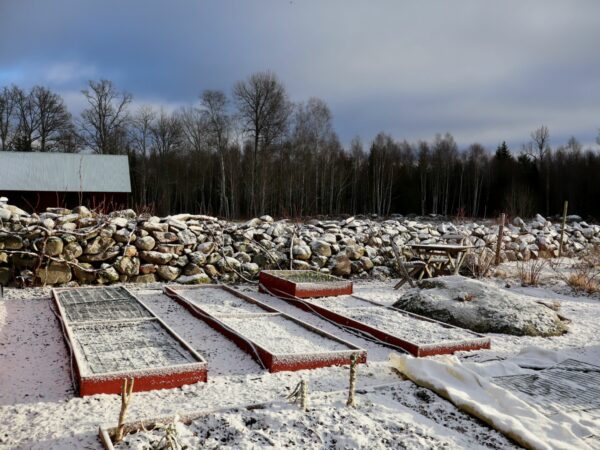Using Mulch and Bokashi in Pots
It doesn't matter where I use it, mulch just works everywhere. I put it in my beds outside and any raised bed too. But don't forget that you can also use bokashi in pots together with mulch!

My eggplant is growing really nicely here in plastic pots in the polytunnel. I keep the soil damp with grass clippings around the plants. I'm also using bokashi in pots here.
This is so smart, you just have to try it! I really recommend using bokashi in pots and containers together with mulch for your tomatoes, peppers, eggplants and cucumbers in summer. I made a habit out if it these past few years and I'm really happy with the results!
Nice and damp
One of the best things about mulching is that it helps keep the soil damp. The layer on top kind of functions as a duvet which forces the water to stay where it is. There's actually a huge difference between the mulched pots and the ones with only soil. The bare pots go dry a lot quicker, especially when the plants grow a bit larger and need more water.
Read more: Soil analysis – Mulching works!

I'm using bokashi in pots for all kinds of plants. It really makes a huge difference!
More nutrients
I put my pots right on the ground in the greenhouse, so I don't put a plate underneath. This way, the surplus water can trickle right down into the ground in the greenhouse and provide the trees in there with water. Putting the pots right on the ground also means that earthworms can find their way in. If you use mulch, then you also get more food for the worms.
They say that every earthworm produces around 0.5 grams of worm manure per day. Plenty of earthworms in one pot will of course mean a lot more nutrient-rich soil! If you on top of that also decide to use bokashi in pots and containers with mulch, then you really have the best possible conditions for your plants.
More: Video guide about bokashi compost
Airy soil
The earthworms don't only provide your soil with nutrients, they also change the texture of the soil. And this is a good thing! Airy soil is better at transporting water, oxygen and nutrients and the plant roots can spread out properly.

Using bokashi in pots is a great way to get even more out of mulching. I'm growing two different plants in the same pot here, tomato and passion fruit.

The soil underneath the grass clippings stays damp all the time even if I don't water them for a while. There are plenty of little insects and earthworms in the pot too!
Get going
Grass clippings is the perfect material to get started with. It turns into high-quality soil in notime with the help of the earthworms. I would recommend not filling the pots that you want to mulch all the way up with soil. Leave around 2-4 inches (or 5-10 centimeters) in large pots so that you have some space for your layer of mulch.
Plant your plant, water and then put a nice layer of grass clippings around the plant. If the plant is small, try to avoid putting the mulch to close though. You can smother it if you do. Let the plant get established in the pot before you push the mulch closer.
You can always add more grass clippings to your pot later if needed. Grass clippings decompose quickly if you have plenty of earthworms in the pot. You can add other plant parts too of course. Weeds, old leaves and stalks for example.
Read more: Storing grass clippings in bags
Which plants?
In my experience, you can start using bokashi for most of the vegetables we grow in large pots in the greenhouse. Tomatoes, cucumbers, melons, peppers, chili, eggplant, basil and tomatillo are a few examples. Potatoes work too, but we usually don't grow them in a greenhouse during summer of course. I would however not mulch leafy greens grown in a smaller space, or a smaller vegetable that can get completely smothered by excess mulching material.
The best way to find out what works and what doesn't is of course to try it. But I don't think that you will have any issues with the vegetables I mentioned above.

I decided to add a solar-powered drip irrigation system in my pots and my eggplants are starting to flower!
More: How long before bokashi compost turns into soil
I just love lifting the mulch every now and then to get a look at what's going on down there. The soil is teeming with activity! So many little critters. And earthworms too! Using bokashi in pots together with mulch is such a great way to help the worms get all the nutrients they need. Wonderful!
You might have noticed that I only use plastic pots in my greenhouses. This is no coincidence. I chose plastic troughs because they stay damp longer. For example clay pots will release a lot more moist in comparison. For me, the gardening just becomes a lot easier to deal with when I grow in plastic. My success rate gets even better when using bokashi in pots with my mulch too!
Good luck mulching your pots!
/Sara Bäckmo



Leave a Reply
You must be logged in to post a comment.